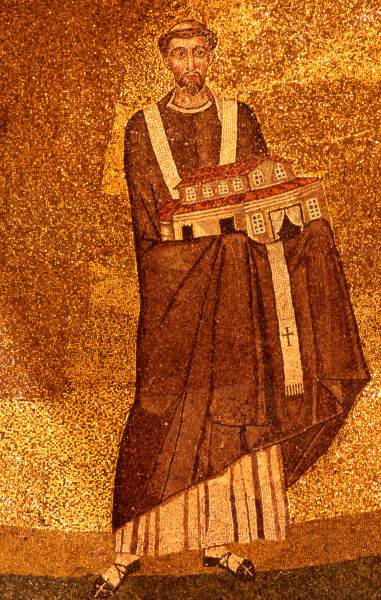
Mosaic depicting Pope Honorius I, from the 7th century basilica of Sant’Agnese fuori le mura, Rome [Wikimedia Commons / Creative Commons Attribution-Share Alike 2.0 Generic license]
***
From my book, The One-Minute Apologist (2007); but this is my initial draft version: significantly different from the text of the published book.
***
The case of Pope Honorius proves that popes have erred, even ex cathedra
If this heretical pope could err so greatly when teaching doctrine, how can we believe that popes are infallible?
Initial reply
If Pope Honorius (r. 625-638) held to the heresy of Monothelitism (Jesus had one will, not two), he nonetheless did not teach it officially or make it a required belief for all Catholics; therefore, the doctrine of papal infallibility was not contradicted.
Extensive reply
The First Vatican Council (1870) definitively explained how and when a papal proclamation is considered infallible (emphasis added):
We teach and define that it is a dogma divinely revealed: that the Roman Pontiff, when he speaks ex cathedra, that is, when, in discharge of the office of pastor and teacher of all Christians, by virtue of his supreme Apostolic authority, he defines a doctrine regarding faith or morals to be held by the universal Church, is, by the divine assistance promised to him in Blessed Peter, possessed of that infallibility with which the divine Redeemer willed that His Church should be endowed.
Without getting into unnecessary and complicated details about the Honorius case, is it true that what he stated about Jesus having “one will” qualify as consciously infallible statements? The answer is “no”; Honorius’ questionable opinions occurred in private letters, not public “encyclicals.” It is argued that since Honorius was condemned as a heretic by the ecumenical Council of Constantinople in 681, he must have uttered a false statement, intended as infallible. But this presupposes that his errors were uttered ex cathedra: at the highest level of Catholic authority. In fact, in these letters he didn’t authoritatively define anything.
Honorius may have personally been a heretic (as is believed by some Catholic scholars), but this would not affect the doctrine of infallibility, either, since he didn’t authoritatively teach a wrong doctrine or make it binding on the entire Church. Other scholars deny that the letters contained heresy, or contend that it was simply a matter of unfortunate, imprudent expression and choice of words (Pope Leo II confirmed the council’s statement and made clear that this was his opinion). Still others think that Honorius was only condemning the notion that Christ had two contrary wills (or at least two not-entirely-harmonious wills), which is a correct and orthodox thing to do.
In any of these scenarios, papal infallibility as understood by Catholics for centuries, is completely unharmed. The Honorius case, though widely considered the very best historical evidence against papal infallibility, is – closely examined — a huge red herring.
In a similar incident, Pope John XXII (r. 1316-1334) denied that souls enjoyed the Beatific Vision prior to the Last Judgment, which was contrary to the received opinion up to that time. He was widely opposed by theologians and the masses of laymen, and the doctrine was defined against his view by his successor, Benedict XII, in 1336. So Pope John XXII was a heretic in that regard, but he didn’t define the doctrine; therefore papal infallibility was again not relevant, as with Honorius. That popes can possibly err in theology, privately, as individual persons, is a notion freely accepted by Catholics.
Objection
Honorius wasn’t the only notorious example of an erring pope. How about Liberius and Vigilius? Don’t their cases also illustrate the falsity of infallibility?
Reply to Objection
These two incidents do not disprove Catholic infallibility, either. The necessary conditions were simply not met. Opinions differ as to whether Liberius (r. 352-366) caved in and signed an Arian statement (Arianism was a rampant heresy that denied the divinity of Christ). But if so, it was as a result of being imprisoned by the Arian emperor Constantius, under threats of possible execution or torture. That hardly qualifies for a free promulgation of a doctrine.
Vigilius (r. 537-555), flip-flopped and wavered on some doctrinal questions involving the doctrine of Christ, too (Monophysitism and Nestorianism). One letter where he supposedly accepted the former heresy is regarded by many scholars as a forgery. Emperor Justinian seized the pope by force, imprisoned him, and this weak pope made questionable statements under coercion and duress (much like Liberius). In any event, the nature of the statements and the conditions do not fall under the sphere of infallibility.
God gives popes the charism of infallibility, for them to be able to teach Christian truth to the whole Church. Only in such cases does it operate; and not once in the long history of the Catholic Church has a pope taught moral or doctrinal error in such an instance.
Dom John Chapman
The letter [to Sergius, Patriarch of Constantinople] cannot be called a private one, for it is an official reply to a formal consultation. It had, however, less publicity than a modern Encyclical. As the letter does not define or condemn, and does not bind the Church to accept its teaching, it is of course impossible to regard it as an ex cathedra utterance . . . It should be noted that he [Emperor Constantine Pogonatus] calls Honorius “the confirmer of the heresy and contradictor of himself”, again showing that Honorius was not condemned by the council as a Monothelite, but for approving Sergius’s contradictory policy of placing orthodox and heretical expressions under the same ban . . . The fault of Honorius lay precisely in the fact that he had not authoritatively published that unchanging faith of his Church, in modern language, that he had not issued a definition ex cathedra. . . . The new pope, Leo II, had naturally no difficulty in giving to the decrees of the council the formal confirmation which the council asked from him, according to custom. The words about Honorius in his letter of confirmation, by which the council gets its ecumenical rank, are necessarily more important than the decree of the council itself: “We anathematize . . . Honorius, who did not attempt to sanctify this Apostolic Church with the teaching of Apostolic tradition, but by profane treachery permitted its purity to be polluted.” This appears to express exactly the mind of the council, only that the council avoided suggesting that Honorius disgraced the Roman Church.
(The Catholic Encyclopedia, 1910, Vol. VII, “Honorius”)
*****
Meta Description: Explanation of how the notorious (infamous) case of Pope Honorius (r. 625-638) does not in the least disprove papal infallibility.
Meta Keywords: apostolic succession, Bible & Papacy, biblical authority, canon of Scripture, ecclesiology, papacy, Petrine primacy, popes, primacy of Rome, Rule of Faith, Sola Scriptura, St. Peter, papal infallibility, Honorius, Vigilius, Liberius













